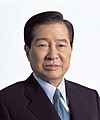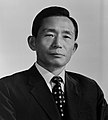
Back بوابة:كوريا الجنوبية Arabic Portal:Cənubi Koreya Azerbaijani دەروازە:کۆریای باشوور CKB Portal:Corea del Sur Spanish Portail:Corée du Sud French Portal:Korea Selatan ID Portale:Corea del Sud Italian 포털:대한민국 Korean Portal:Coreia do Sul Portuguese ද්වාරය:දකුණු කොරියාව Singhalese
 |
환영합니다! / Welcome To The South Korea Portal!  South Korea, officially the Republic of Korea (ROK), is a country in East Asia. It constitutes the southern part of the Korean Peninsula and borders North Korea along the Korean Demilitarized Zone; though it also claims the land border with China and Russia. The country's western border is formed by the Yellow Sea, while its eastern border is defined by the Sea of Japan. South Korea claims to be the sole legitimate government of the entire peninsula and adjacent islands. It has a population of 51.96 million, of which half live in the Seoul Capital Area, the ninth most populous metropolitan area in the world. Other major cities include Busan, Daegu, and Incheon. The Korean Peninsula was inhabited as early as the Lower Paleolithic period. Its first kingdom was noted in Chinese records in the early 7th century BCE. After the unification of the Three Kingdoms of Korea into Silla and Balhae in the late 7th century, Korea was ruled by the Goryeo dynasty (918–1392) and the Joseon dynasty (1392–1897). The succeeding Korean Empire (1897–1910) was annexed in 1910 into the Empire of Japan. Japanese rule ended following Japan's surrender in World War II, after which Korea was divided into two zones: a northern zone occupied by the Soviet Union, and a southern zone occupied by the United States. After negotiations on reunification failed, the southern zone became the Republic of Korea in August 1948, while the northern zone became the communist Democratic People's Republic of Korea the following month. In 1950, a North Korean invasion began the Korean War, which ended in 1953 after extensive fighting involving the American-led United Nations Command and the People's Volunteer Army from China with Soviet assistance. The war left 3 million Koreans dead and the economy in ruins. The authoritarian First Republic of Korea led by Syngman Rhee was overthrown in the April Revolution of 1960. However, the Second Republic failed to control the revolutionary fervor. The May 16 coup of 1961 led by Park Chung Hee put an end to the Second Republic, signaling the start of the Third Republic in 1963. South Korea's devastated economy began to soar under Park's leadership, recording the one of fastest rises in average GDP per capita. Despite lacking natural resources, the nation rapidly developed to become one of the Four Asian Tigers based on international trade and economic globalization, integrating itself within the world economy with export-oriented industrialization. The Fourth Republic was established after the October Restoration of 1972, in which Park wielded absolute power. The Yushin Constitution declared that the president could suspend basic human rights and appoint a third of the parliament. Suppression of the opposition and human rights abuse by the government became more severe in this period. Even after Park's assassination in 1979, the authoritarian rule continued in the Fifth Republic led by Chun Doo-hwan, which violently seized power by two coups and brutally suppressed the Gwangju Uprising. The June Democratic Struggle of 1987 ended authoritarian rule, forming the current Sixth Republic. The country is now considered among the most advanced democracies in Continental and East Asia. (Full article...) Selected article -
The South Korean government, under the regime of Park Chung Hee, took an active role in the Vietnam War. South Korea's decision to join resulted from various underlying causes, including the development of US-South Korea relations, political exigencies, and the promise of economic aid from the United States. Under the wartime alliance, the South Korean economy flourished, receiving tens of billions of dollars in grants, loans, subsidies, technology transfers, and preferential economic treatment. From September 1964 to March 1973, South Korea sent some 350,000 troops to South Vietnam. The South Korean Army, Marine Corps, Navy, and Air Force all participated as an ally of the United States. The number of troops from South Korea was much greater than those from Australia and New Zealand, and second only to the U.S. military force for foreign troops located in South Vietnam. The military commander was Lieutenant General Chae Myung-shin of the South Korean army. Participation of Korean forces in the war included both non-combatant and combatant roles. (Full article...)
Selected image The 2010 G-20 Seoul summit was the fifth meeting of the G-20 heads of government to discuss the global financial system and the world economy. It was held in Seoul, South Korea. More did you know -
In the news
This is a Good article, an article that meets a core set of high editorial standards.
 Girls' Generation (Korean: 소녀시대; RR: Sonyeo Sidae), also known as SNSD, is a South Korean girl group formed by SM Entertainment. The group is composed of eight members: Taeyeon, Sunny, Tiffany, Hyoyeon, Yuri, Sooyoung, Yoona, and Seohyun. Originally a nine-piece ensemble, member Jessica departed from the group in September 2014. Among the most known South Korean figures and successful K-pop groups worldwide, Girls' Generation has earned numerous accolades and the honorific nickname "The Nation's Girl Group" in their home country. Girls' Generation debuted on August 5, 2007, with the single "Into the New World" from their eponymous Korean album. The group rose to fame in 2009 with the single "Gee", which claimed the top spot on KBS's Music Bank for a record-breaking nine consecutive weeks and was Melon's most popular song of the 2000s decade. The group cemented their popularity in Asia with follow-up singles "Genie", "Oh!", and "Run Devil Run", which were released between mid-2009 and early 2010. Their second Korean studio album, Oh! (2010), won the Golden Disc award for Album of the Year (Disk Daesang), making the group the first and only female act to win the Album Daesang. Girls' Generation ventured into the Japanese music scene in 2011 with their eponymous Japanese album, which became the first album by a non-Japanese girl group to be certified million by the RIAJ. The group's third Korean studio album, The Boys, was the best-selling album of 2011 in South Korea. An English version of the single "The Boys" was released in an attempt to expand the group's endeavor to the global music scene. The group's fourth Korean studio album, I Got a Boy (2013), was supported by the title track, which won Video of the Year at the inaugural YouTube Music Awards. Girls' Generation continued to build upon their popularity with their fifth and sixth Korean studio albums, Lion Heart (2015) and Holiday Night (2017). Following a five-year hiatus to focus on their individual careers, they returned with their seventh Korean studio album Forever 1 (2022). (Full article...)General images -The following are images from various South Korea-related articles on Wikipedia.
Did you know (auto-generated)
WikiProjectsSee WikiProject Korea for collaborating on South Korea topics, and more broadly, on all things Korea-related. South Korea topics
CategoriesAdministrative divisions of South Korea
Related portalsEast Asia Associated WikimediaThe following Wikimedia Foundation sister projects provide more on this subject:
Web resources
SourcesDiscover Wikipedia using portals |
© MMXXIII Rich X Search. We shall prevail. All rights reserved. Rich X Search























































